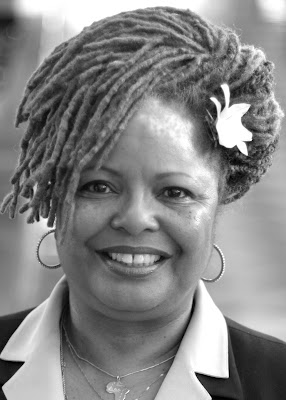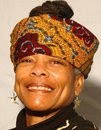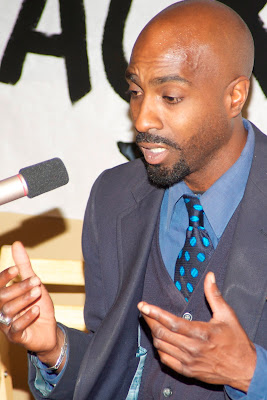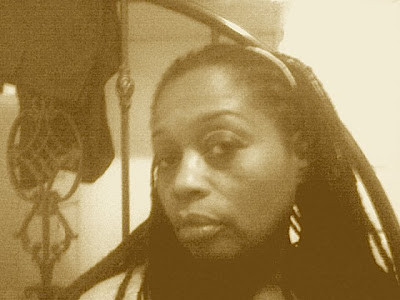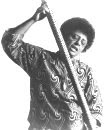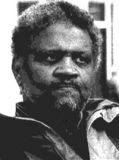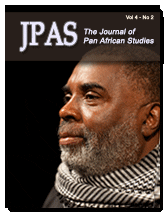Joyce Gordon Reading
Bay Area Writers/activists honor slain Oakland Post Editor Chauncey Bailey outside Joyce Gordon Gallery
 Journal of Pan African Studies
Journal of Pan African Studies
Poetry ReadingBay Area Poets Read their Entries
Joyce Gordon Gallery, 14th and Franklin, downtown Oakland
Saturday, February 19, 3-6p
Al Young, California Poet Laureate EmeritusParadise Jah Love
Phavia Kujichagulia
Ptah Allah El
Senior Editor, JPAS
Fritz Pointer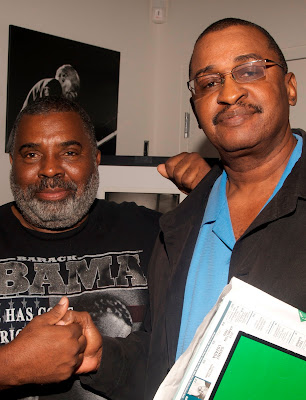
J. Vern Cromartie
Ishmael Reed
Anthony Spires
Not pictured: Kwan Booth, Charles Blackwell, Niyah X, Maisha, Nykimbe, Ramal Lamar, Aries Jordan
Joyce Gordon Gallery
14th and Franklin, downtown Oakland
presents
Academy of da Corner
Reader's TheatreSaturday, February 19, 3-6pm
Reading from
The Journal of Pan African Studies, Poetry Issue
Guest Editor Marvin X
Marvin X has always been in the forefront of Pan African writing. Indeed, he is one of the innovators and founders of the revolutionary school of African writing. --Amiri BarakaAn excellent collection of poetry from some of the best poets in America. The best selection of poems that any Guest Editor has ever put together!--Rudolph Lewis, Editor, Chickenbones.com
An Academy of da Corner Reader's Theatre
production, 14th and Broadway, downtown Oakland
Black Bird Press
Journal of Pan African Studies
Joyce Gordon Gallery
Refa I
Oakland Post Newspaper Group
Media: Gregory Fields, Adam Turner, Ken Johnson, Khalid Wajjib, Kamau Amen Ra, Gene Hazzard, Lee Hubbard, Wanda SabirThe Journal of Pan African Studies will be on sale at the event, 475 pages, $49.95. It is available online as well. www.jpanafrican.com
Information: jmarvinx@yahoo.com
Guest Editor's Notes on the Journal of Pan African Studies, Poetry IssueIf one is serious about getting a precise understanding of the 1960s Black Arts Movement, the most radical artrs and literary movement in American history, that forced the inclusion of ethnic literature into academia, one must grab the recent Journal of Pan African Studies, Poetry Issue.
The issue has poems by some of the BAM major players (Baraka, Bullins, Madhubuti, Ya Salaam, Toure, and X, as well as essays and dialogue on the literary productions of BAM, the proposition that the genre called Muslim American literature is based on the BAM Islamic influence, with roots in Moorish Science, Nation of Islam, Sufic, Sunni and Yoruba influences, although the Yoruba is not explained yet self evident in the poetry.
There is discussion on the poetic mission, and in the BAM tradition it is argued that poetry is not an end within itself but a vehicle, a tool, a weapon in the arsenal of liberation, and most importantly, a tool of communication.
The poems are drums of Pan Africa, message to and from the God and gods, ancestors, the living and yet unborn. Entries are from Nigeria, Ghana, South Africa, Kenya, United Kingdom, South Korea, New Zealand and throughout the United States.
We tried to give a regional sample from the west coast, east coast, mid west and south. You will find a commonality of themes and concerns, freedom most of all, but listen carefully to the regional rhythms on the poetic drums.
Overall, it represents an alternative world view, the Pan African world view as opposed to the Eurocentric world view. It is the world view of the oppressed, yet the spiritually liberated for the poets are, if nothing else, free spirits that cannot be caged, whipped or defeated, for they say you can kill the revolutionary but can't kill the revolution, thus the word causes forward motion in the ocean of humanity, and such are the contents herein. Magic words, magic truths, wisdom and and prophesy.
It is obvious from the bios that most of the poets are trained in academia, whatever their other origins. For sure the nuances of language transcends traditional English, for it is a language rooted in decolonizaton and liberation. Thus, many of the poets are bilingual, making use of the master's tongue and the tongue of the masses.
The BAM theme of revolutionary consciousness is pervasive. Associate Guest Editor Ptah Allah El says this is the Bible for the 21 Century. So it is! Like Black Fire of the 60s, let it fire up a static situation with the word. Let the Pan African mind move a little closer to home.
--Marvin X
1/15/11


